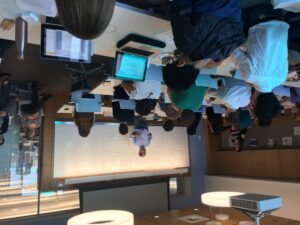Bridging the Gap Between Science and Business
This article was originally published in Results & Discussion, Issue 5, Spring 2017.
By Derrick Cumberbatch, Graduate Student
“Participating in this module helped me have a more entrepreneurial mindset, which has changed how I view my career. Seeing business as an integral part of everything we do has made me more mindful in how I choose to develop my career,” says Henry Ong, Ph.D., who was a postdoctoral fellow when he attended a short course in entrepreneurship offered by Vanderbilt’s BRET Office of Career Development. Now, as a project manager at the Vanderbilt Institute for Clinical and Translational Research (VICTR) where he helps move large institutional programs forward, he is putting into practice many of the skills he learned that summer. The employment landscape for biomedical sciences Ph.D. students has been dramatically shifting over the last several decades. Historically, biomedical graduate student training focused exclusively on preparing individuals to oversee their own research labs in a traditional tenure-track faculty position. However, it is now widely accepted that greater than 75% of these trainees will go on to an incredibly diverse array of careers outside of this traditional faculty role.

In response to the evolving needs of its trainees, Vanderbilt’s BRET Office of Career Development, directed by Kim Petrie Ph.D., developed two unique business modules targeted to scientists in collaboration with Robert Carnahan Ph.D., Associate Professor of Cancer Biology and Director, Vanderbilt Antibody and Protein Resource Facility. The first, the Summer Intensive for Entrepreneurship and Commercialization will be offered for the third- time in June and is led by John Bers, Ph.D., Adjoint Professor of Engineering Management. This short course focuses on the fundamental business principles of commercializing a scientific innovation. The second module, Management and Business Principles for Scientists, is taught by Joseph Rando, MBA, Associate Professor of the Practice of Managerial Studies. Currently in its second year, this course emphasizes key concepts and tools used in the business world to give leaders and managers a strategic advantage in evaluating situations and making effective business decisions.
“The beauty of talking to a room full of scientists is that they are all trained problem solvers. I’ve really enjoyed the opportunity to work with this unique group of students because they are great logical, organized thinkers. Many of them have never taken a business course, yet the problems and challenges they encounter as scientists have many parallels to those of the business world. It has been exciting to help arm them with new tools that can help them succeed in whatever career path they choose to pursue,” said Professor Rando.
Both modules are comprised of didactic lectures and project-based group learning which allows

participants to put course principles into practice. “It was a great opportunity for scientists to cross-train their problem-solving skills with the challenges of the business world,” said William (Reid) Bolus, a graduate student in the Department of Molecular Physiology and Biophysics, who participated in the module last year. In the case of the Summer Intensive for Entrepreneurship and Commercialization, teams work together to develop a technology commercialization proposal and investment pitch. It is ideal for trainees interested in exploring careers as innovation-focused faculty, technology entrepreneurs, strategy consultants, or executives in technology-based firms. The Management and Business Principles for Scientists module builds its team projects around solving real-world problems faced by Vanderbilt CORE Facilities. By working in consultation with a CORE Director, students and post-docs learn strategies that will help them with their own independent careers regardless of whether it is leading a team of scientists, managing a lab, or overseeing a technology start-up.
Former Management and Business Principles for Scientists module participant, Keenan Taylor, Ph.D., a post-doctoral fellow in the Department of Biochemistry who intends to manage a scientific research program in the future said, “I could not pass up an opportunity to develop such skill sets.” He further added, “I fully expect that this training will be very helpful as my career progresses and I assume a more significant leadership role.”
Graduate students and postdocs seem to be taking notice of these opportunities, as there have been nearly twice as many applicants as there are slots for the modules, which are limited to 24 participants. Trainees are not the only ones recognizing the value of these modules. In 2016, the module was awarded second place by the American Association of Medical Colleges (AAMC) for its Innovations in Research Education Award.
When asked why she is currently participating in the Management and Business Principles for Scientists module, Roxana Loperena, a graduate student in the Department of Molecular Physiology and Biophysics revealed that an academic lab is basically a small business, so Ph.D. students “need to know how to manage budgets and hire new people”. Loperena has her sights set on taking on a project management role in an industry setting and recognizes the importance of gaining management skills as part of her Ph.D. training.
The Management and Business Principles for Scientists and the Summer Intensive for Entrepreneurship and Commercialization modules were made possible with a one-year Career Guidance for Trainees grant from the Burroughs Wellcome Fund. The BRET Office of Career Development hopes to carry on offering both of these modules and is actively seeking partnerships to help support their continuation.
“By testing whether the learning objectives of each module were met, surveying participants and tracking outcomes, we can happily conclude that these two modules positively impacted the business acumen, career confidence and career trajectories of the participants,” said Kathleen Gould, Ph.D., Associate Dean for Biomedical Sciences, Director of Graduate Student Support, and Professor of Cell and Developmental Biology. “The development and implementation of these modules also allowed us to extend our career development network and bring together new institutional and local business partners keenly interested in educating the biomedical workforce of the future. Indeed, the modules exemplify the spirit of cross-disciplinary training and innovation that features in the latest VU strategic plan.”